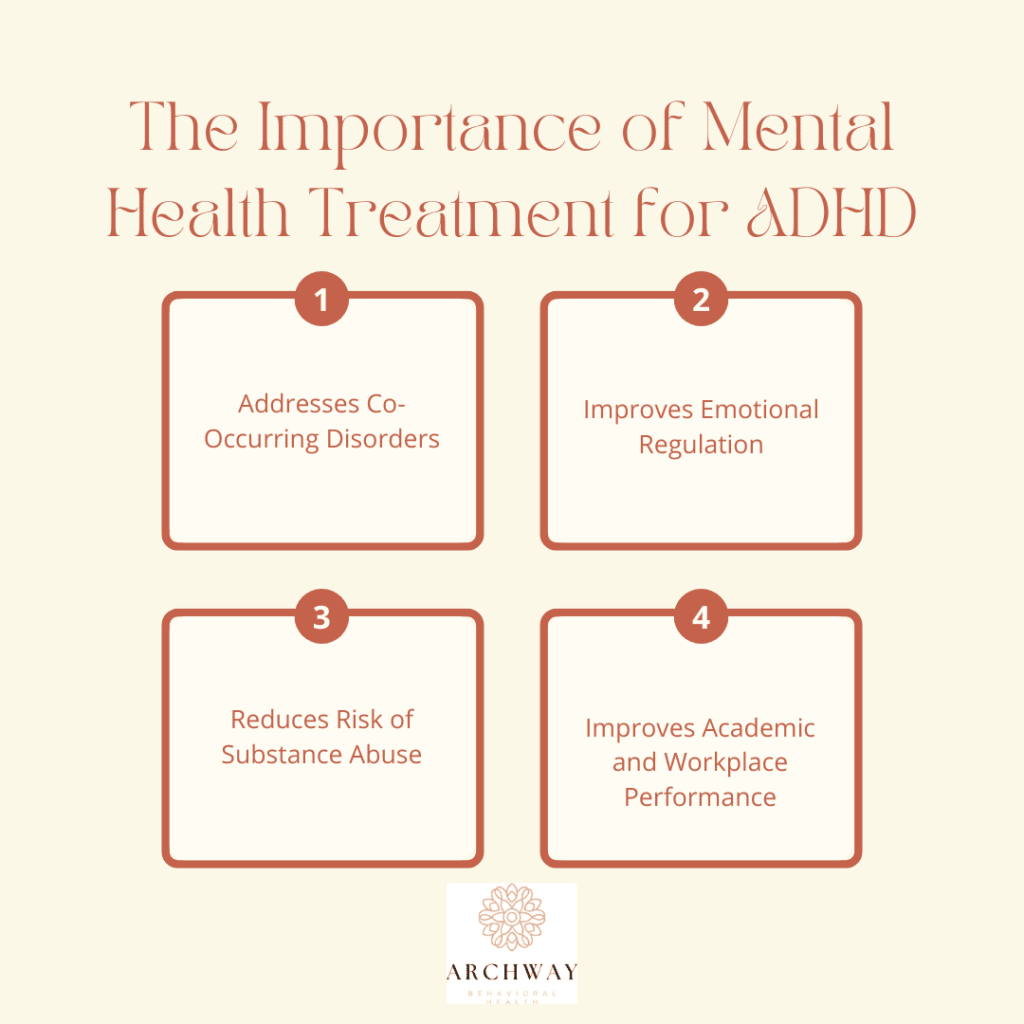While ADHD is often associated with hyperactivity and difficulty focusing, it can also have a significant impact on mental health. People with ADHD may experience issues such as anxiety, depression, and low self-esteem, which makes addressing their mental health just as important as managing their ADHD symptoms. Understanding the relationship between ADHD and mental health is crucial in creating effective treatment plans.
ADHD and Its Impact on Mental Health
ADHD can contribute to a wide range of mental health challenges. People with ADHD often struggle with feeling misunderstood, which can lead to frustration, anxiety, or even depression. They may also have difficulty managing emotions, which can result in mood swings or outbursts.
Another factor to consider is the potential for co-occurring mental health conditions. Many people with ADHD are also diagnosed with anxiety disorders, depression, or other mood disorders. These overlapping conditions can make it harder for individuals to cope with day-to-day stress and increase the need for comprehensive mental health treatment services.
ADHD and Co-Occurring Mental Health Conditions
People with ADHD are at a higher risk of experiencing co-occurring mental health conditions such as anxiety, depression, and mood disorders. This can result from the struggles of living with ADHD, such as difficulties in maintaining focus, impulse control, and hyperactivity. These symptoms can contribute to feelings of frustration, social challenges, and low self-esteem, which, in turn, may lead to emotional dysregulation and other mental health issues.
The link between ADHD and mental health conditions is known as “comorbidity,” where one disorder overlaps with or exacerbates the symptoms of another. For instance, individuals with ADHD may struggle to manage stress or navigate relationships, leading to increased anxiety. Similarly, untreated ADHD can contribute to feelings of inadequacy or failure, which can develop into depression.
ADHD and Emotional Dysregulation
Emotional dysregulation is another common challenge for individuals with ADHD. Those affected may struggle to regulate their emotions, leading to sudden mood swings, irritability, or intense emotional reactions. Emotional dysregulation can interfere with daily functioning and often complicates mental health treatment. The mental health treatment center at Archway Behavioral Health offers targeted interventions to address these concerns through structured and compassionate care.
The Importance of Mental Health Treatment for ADHD
Working with a mental health treatment center can provide access to professional support, whether it’s through one-on-one therapy or a group therapy program. These therapy approaches offer safe spaces to explore emotions, identify triggers, and learn coping strategies that can help reduce stress and anxiety.
Therapists often use specific techniques like Cognitive Behavioral Therapy to help individuals challenge negative thought patterns and build healthier emotional responses. Additionally, Dialectical Behavior Therapy focus on improving emotional regulation and mindfulness, skills that are particularly helpful for people with ADHD.
Therapy Options for ADHD and Mental Health
There are several therapy options available to address ADHD and its connection to mental health. Depending on the individual’s needs, different programs may be more suitable:
1. One-on-One Therapy
For those who prefer a more personalized approach, one-on-one therapy offers a direct relationship with a therapist who can provide tailored strategies. This allows individuals to dive deep into their personal experiences and receive customized feedback on managing both ADHD and co-occurring mental health issues.
2. Group Therapy Program
A group therapy program offers individuals the chance to share their experiences with others facing similar challenges. Not only can this foster a sense of community, but it also allows participants to learn from each other’s coping techniques and gain support.
3. Partial Hospitalization Program (PHP)
For individuals who require more intensive care, a partial hospitalization program (PHP) is a highly structured treatment option. It provides daily therapeutic support while allowing participants to return home in the evenings.
4. Intensive Outpatient Program (IOP)
An Intensive Outpatient Program (IOP) is another option that offers flexibility while still providing structured mental health care. Individuals attend therapy sessions a few times a week while continuing with their day-to-day activities.
Treatment Options for ADHD and Co-Occurring Conditions
At Archway Behavioral Health, our mental health treatment services focus on comprehensive approaches to help individuals manage both ADHD and related mental health challenges. We offer an array of services, including Dialectical Behavior Therapy (DBT) and Cognitive Behavioral Therapy (CBT), which have been proven effective in helping individuals manage emotional dysregulation, anxiety, and depression associated with ADHD.
- Dialectical Behavior Therapy (DBT) helps individuals develop mindfulness, emotional regulation, and interpersonal effectiveness skills. For those with ADHD who also experience mood swings or emotional outbursts, DBT provides the tools necessary to build healthier coping mechanisms.
- Cognitive Behavioral Therapy (CBT) is another effective approach, addressing negative thought patterns and behaviors that may arise from the difficulties of managing ADHD. Through CBT, individuals can gain a better understanding of how their thoughts impact their actions, leading to more positive mental health outcomes.
How Mental Health Treatment Helps with ADHD
A comprehensive approach to ADHD treatment should include addressing the mental health impacts. Centers that specialize in mental health treatment services provide a wide range of programs designed to meet the unique needs of people with ADHD.
Moreover, addressing co-occurring mental health conditions through therapy can improve overall quality of life. Learning coping strategies, such as mindfulness and emotional regulation techniques offered by Dialectical Behavior Therapy, can significantly reduce anxiety and improve emotional control.
CBT, widely available at Cognitive Behavioral Therapy , teaches individuals how to identify negative thoughts and replace them with more constructive ones. This type of therapy is particularly effective in managing both ADHD symptoms and mental health issues, such as depression or anxiety.
Get the Support You Need
At Archway Behavioral Health, we understand the complexities of living with ADHD and its impact on mental health. Our comprehensive mental health treatment services are tailored to meet the individual needs of each patient, offering a path to greater emotional well-being and personal growth.
If you or a loved one is struggling with ADHD and mental health challenges, reach out to our mental health treatment center today. Through our Dialectical Behavior Therapy Centers, Cognitive Behavioral Therapy Centers, One-on-One Therapy, and group therapy program, we are here to help you find balance and healing.
Conclusion
ADHD treatment program is not just about managing attention and hyperactivity – it’s about understanding and addressing the mental health challenges that often come with the condition. Seeking help from a mental health treatment center can be the first step toward gaining better control over one’s mental health. With options like one-on-one therapy, group therapy programs, partial hospitalization programs, and Intensive Outpatient Programs, individuals with ADHD can receive the care and support they need to thrive both emotionally and mentally.
By focusing on a holistic approach, ADHD and its related mental health conditions can be managed effectively, leading to a more fulfilling and balanced life. Reach out today at (888) 488-4103 and take the first step towards hope and healing.
FAQ on Link Between ADHD and Mental Health
What is the connection between ADHD and mental health?
ADHD is often linked to mental health conditions like anxiety, depression, and mood disorders. These co-occurring conditions can exacerbate ADHD symptoms, making diagnosis and treatment more complex.
What mental health conditions are commonly associated with ADHD?
Individuals with ADHD are more likely to experience anxiety, depression, emotional dysregulation, and mood disorders due to the challenges they face managing ADHD symptoms.
How can ADHD affect emotional regulation?
People with ADHD may struggle with emotional dysregulation, experiencing intense emotional reactions, mood swings, or difficulty managing their emotions, which can further impact their mental health.
What types of therapy are effective for treating ADHD and mental health issues?
At Archway Behavioral Health, Dialectical Behavior Therapy (DBT) and Cognitive Behavioral Therapy (CBT) are commonly used to treat ADHD and related mental health conditions by providing tools to manage emotions and thought patterns.
What treatment programs are available at Archway Behavioral Health for ADHD and mental health?
We offer a range of programs, including One-on-One Therapy, a group therapy program, as well as more structured options like the Partial Hospitalization Program (PHP) and Intensive Outpatient Program (IOP) for individuals needing comprehensive support.
What is the Partial Hospitalization Program (PHP)?
The PHP at Archway Behavioral Health provides daytime care, where participants receive therapy and support throughout the day but return home in the evenings. It’s a structured option for those who need intensive treatment but not 24-hour supervision.
What is the Intensive Outpatient Program (IOP)?
The IOP allows individuals to attend therapy sessions several days a week while continuing their daily responsibilities, offering flexibility in treatment for ADHD and co-occurring mental health conditions.
How do I get started with treatment for ADHD and mental health at Archway Behavioral Health?
Contact Archway Behavioral Health today to learn more about our comprehensive mental health treatment services, including DBT, CBT, One-on-One Therapy, and group therapy programs tailored to help you manage ADHD and mental health challenges.



